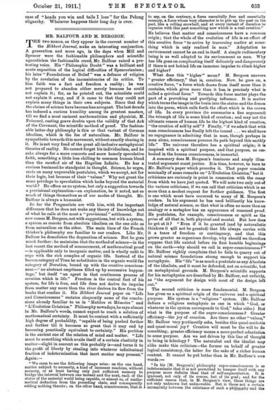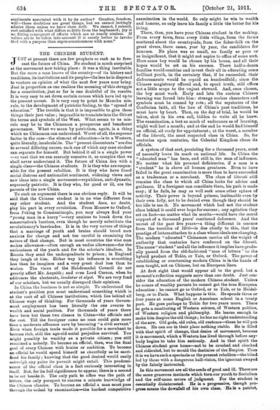MR. BALFOUR AND M. BERGSON. T HE two names, as they
appear in the current number of the Hibbert Journal, make an interesting conjunction. A generation and more ago, in the days when Mill and Spencer were the fashionable philosophers and scientific agnosticism the fashionable creed, Mr. Balfour raised a pro-
testing voice. His " Philosophic Doubt " was a brilliant and acute exposition of the logical difficulties of Spencerianism ; his later " Foundations of Belief " was a defence of religion by the revelation of the inconsistencies of its critics. To him faith was a fact and freedom a reality ; he was not prepared to abandon either merely because he could not explain it ; for, as he pointed out, the scientists could not explain it away, and if it came to that they could not explain many things in their own subjects. Since that day the claims of science have become less arrogant. The last decade has induced a curious humility among its greatest masters,
till we find a most eminent mathematician and physicist, M. Poincare, casting grave doubts upon the validity of that Ark of the Covenant, the scientific method of proof. The fashion- able latter-day philosophy is this or that variant of German idealism, which is the foe of naturalism. Mr. Balfour is sympathetic towards this movement, without exactly sharing in it. He is not very fond of the great all-inclusive metaphysical theories of reality. He cannot forget his individualism, and he
asks always for a more concrete and more homely speculative faith, something a little less chilling to common human blood than the rarefied air of the Hegelian Infinite. He has a curious businesslike standpoint in thought. Science, he urges, rests on many unprovable postulates, which we accept, not for their logic, but because of their "values." Why not grant the same privilege to speculation which looks beyond the material world ? He offers us no system, but only a suggestion towards a provisional explanation—an explanation, be it noted, not so much of things themselves as of our modes of thought. Mr. Balfour is always a humanist.
So far the Pragmatists are with him, with the important difference that he does not make any theory of knowledge out
of what he calls at the most a " provisional " settlement. But now comes M. Bergson, not with suggestions, but with a system, a system as remote from absolute idealism on the one side as from naturalism on the other. The main lines of the French thinker's philosophy are familiar to our readers. Like Mr, Balfour be demolishes the dogmatism of science. But he goes
much further : he maintains that the method of science—in the last resort the method of measurement, of mathematical proof —is applicable only to inorganic matter, and is wholly unfit to cope with the rich complex of organic life. Instead of the barren category of Time he substitutes in the organic world the category of Duration, bound up with the creative conscious- ness—" no abstract emptiness filled up by successive happen- ings," but itself " an agent in that continuous process of creation which is life." Freedom is the central fact of his
system, for life is free, and life does not derive its impulse from matter any more than the river derives its flow from the banks that confine it. His Hibbert Journal paper on " Life
and Consciousness " restates eloquently some of the conclu- sions already familiar to us in "Matiere et Memoire " and " L'Evolution Creatrice." Philosophy nowadays, he says almost in Mr. Balfour's words, cannot expect to reach a solution of mathematical certainty. It must be content with a sufficiently high degree of probability, "capable of being pushed farther and farther till it becomes so great that it may end by becoming practically equivalent to certainty." His problem is the ancient one of the relation of mind and matter. " Life must be something which avails itself of a certain elasticity in matter—slight in amount as this probably is—and turns it to the profit of liberty by stealing into whatever infinitesimal fraction of indetermination that inert matter may present." Again:—
" We seem to see the following image arise: on the one hand, matter subject to necessity, a kind of immense machine, without memory, or at least having only just sufficient memory to bridge the interval between one instant and the next, each of the states of the material world being capable, or almost so, of mathe- matical deduction from the preceding state, and consequently adding nothing thereto ; on the other hand, consciousness, that is to say, on the contrary, a force essentially free and essentially memory, a force whose very character is to pile up the past on the past, like a rolling snowball, and at every instant of duration to organize with this past something new which is a real creation."
He believes that matter and consciousness have a common origin ; that the whole of the evolution of life is an effort of
this creative force " to arrive by traversing matter at some- thing which is only realized in man." Adaptation to environment cannot be an end in itself. A simple rudimentary being is as well adapted to its environment as man. Why has life gone on complicating itself delicately and dangerously if there is not behind life an immense impulse to climb higher and higher?
What does this "higher" mean? M. Bergson answers " greater efficiency," that is, creation. Now, he goes on, a creative force, " a force which draws from itself more than it
contains, which gives more than it has, is precisely what is called a spiritual force." Towards this force matter plays the part of a provoking and purifying influence. It is matter which turns the image in the brain into the statue and the dream into the poem, which calls forth the effort which is the crown of life. In every province (to summarize a fine argument) the triumph of life is some kind of creation ; and may not the ultimate reason of human life be the highest kind of creation, " the creation of self by self" P Finally, " if we admit that with
man consciousness has finally left the tunnel . .. we shall have no repugnance in admitting that in man, though perhaps in
man alone, consciousness pursues its path beyond this earthly life." The universe therefore has a spiritual origin; it is
inspired with a spiritual purpose, and that purpose, as em- bodied in the human consciousness, is immortal.
A summary does M. Bergson's luminous and amply illus- trated argument scant justice. It is time, however, to turn to Mr. Balfour's paper which precedes it. That paper consists
nominally of some remarks on "L'brolution Creatrice," but it criticisms are curiously in point in connexion with the essay from which we have just quoted. We will note two only out of the various criticisms, if we can call that criticism which is no
more than a modest request for further guidance. The first is one which must have occurred to many of M. Bergson'■ readers. In his argument he has used brilliantly his know-
ledge of natural science, so that what is often no more than an analogy or a metaphor has an appearance of reasoned proof.
He postulates, for example, consciousness or spirit as the prius of all that is, both physical and mental. But how does
he get at it P " Even if it be granted (and by naturalistic thinkers it will not be granted) that life always carries with it a trace of freedom or contingency, and that this grows greater as organisms develop, why should we therefore suppose that life existed before its first humble beginnings on the earth—why should we call in super-consciousness P" Mr. Balfour rightly complains that he fails to quarry out of natural science foundations strong enough to support his
metaphysic. His "life " is as much a postulate as any Absolute of the idealists, and it must be defended, not on scientific, but on metaphysical grounds. M. Bergson's scientific supports for his metaphysics are described by Mr. Balfour, not unfairly,
as "the argument for design with most of the design left out."
The second criticism is more fundamentaL M. Bergson has given us a spiritual origin of the universe and a spiritual purpose. His system is a "religious " system. (Mr. Balfour defines a religious metaphysic as one in which " God, or whatever in the system corresponds to God," takes sides.) But what is the purpose of the super-consciousness P Greater efficiency—the joy of creation. Are there no other "values,"
Mr. Balfour very pertinently asks, besides this quasi-aesthetics and quasi-moral joy P Creative will must be the will to do something ; greater efficiency means a more perfect adaptation to some purpose. Are we not driven by this line of thought to bring in teleology ? The naturalist and the idealist may alike make this criticism—the former on behalf of greater logical consistency, the latter for the sake of a richer human content. It cannot be put better than in Mr. Balfour's own words
"In his [M. Bergson's] philosophy super-consciousness is so indeterminate that it is not permitted to hamper itself with any purpose more definite than that of self-augmentation. It is ignorant, not only of its course, but of its goal ; and for the sufficient reason that, in M. Bergson's view, these things are not only unknown but unknowable. But is there not a certain incongruity between the substance of such a philosophy and the
sentiments associated with it by its author? Creation, freedom, will—these doubtless are great things, but we cannot lastingly admire them unless we know their drift. We cannot, I submit, rest satisfied with what differs so little from the haphazard; joy is no fitting consequent of efforts which are so nearly aimless. If values are to be taken into account it is surely better to invoke God with a purpose than supra-consciousness with none."















































 Previous page
Previous page